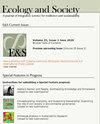Understanding stakeholder perceptions of environmental justice: a study of tourism in the Erhai Lake basin, Yunnan province, China
IF 3.2
2区 社会学
Q1 ECOLOGY
引用次数: 0
Abstract
Environmental justice is an important component of sustainable tourism, but stakeholder perspectives related to environmental justice may vary. Using Q-methodology, we investigated different stakeholder perceptions related to environmental justice within the context of tourism and ecological restoration. Specifically, in the Erhai Lake basin, China, we explore perspectives around an ecological restoration effort that included the government mandated closure of 1900 establishments (inns and restaurants) in response to environmental degradation. We identify and explore four environmental justice perspectives: the togetherness, protection, operator loss, and local loss perspectives. These four perspectives are contextualized within three dimensions of environmental justice (i.e., distribution, recognition, and participation). Our findings highlight differing views related to who is affected most by the inn closures (e.g., future generations, local residents, inn owners), and general consensus related to the outcomes of the process being more important than the process itself. Finally, we discuss potential reasons for these differing perspectives and recommend ways to improve environmental justice among different stakeholders. This research can facilitate sustainable development of tourism by highlighting the facets of ecological restoration policy implementation most important to stakeholders, including recognition of diverse stakeholder concerns and identities, clear and well supported rationale for policy design, and increased equity in the distribution of costs and benefits of policies.理解利益相关者对环境正义的看法:基于云南洱海流域旅游业的研究
环境正义是可持续旅游的重要组成部分,但利益相关者对环境正义的看法可能有所不同。使用q -方法论,我们调查了旅游和生态恢复背景下不同利益相关者对环境正义的看法。具体而言,在中国洱海流域,我们探讨了围绕生态恢复工作的观点,其中包括政府下令关闭1900家机构(旅馆和餐馆)以应对环境恶化。我们确定并探讨了四种环境正义的观点:团结、保护、经营者损失和当地损失的观点。这四种观点在环境正义的三个维度(即分配、承认和参与)中被语境化。我们的研究结果突出了关于谁受酒店关闭影响最大的不同观点(例如,后代,当地居民,酒店所有者),以及与过程结果相关的普遍共识比过程本身更重要。最后,我们讨论了这些不同观点的潜在原因,并提出了在不同利益相关者之间改善环境正义的方法。本研究通过突出生态恢复政策实施对利益相关者最重要的方面,包括认识利益相关者的不同关注点和身份,明确和有充分支持的政策设计理由,以及增加政策成本和收益分配的公平性,从而促进旅游业的可持续发展。
本文章由计算机程序翻译,如有差异,请以英文原文为准。
求助全文
约1分钟内获得全文
求助全文
来源期刊

Ecology and Society
环境科学-生态学
CiteScore
6.20
自引率
4.90%
发文量
109
审稿时长
3 months
期刊介绍:
Ecology and Society is an electronic, peer-reviewed, multi-disciplinary journal devoted to the rapid dissemination of current research. Manuscript submission, peer review, and publication are all handled on the Internet. Software developed for the journal automates all clerical steps during peer review, facilitates a double-blind peer review process, and allows authors and editors to follow the progress of peer review on the Internet. As articles are accepted, they are published in an "Issue in Progress." At four month intervals the Issue-in-Progress is declared a New Issue, and subscribers receive the Table of Contents of the issue via email. Our turn-around time (submission to publication) averages around 350 days.
We encourage publication of special features. Special features are comprised of a set of manuscripts that address a single theme, and include an introductory and summary manuscript. The individual contributions are published in regular issues, and the special feature manuscripts are linked through a table of contents and announced on the journal''s main page.
The journal seeks papers that are novel, integrative and written in a way that is accessible to a wide audience that includes an array of disciplines from the natural sciences, social sciences, and the humanities concerned with the relationship between society and the life-supporting ecosystems on which human wellbeing ultimately depends.
 求助内容:
求助内容: 应助结果提醒方式:
应助结果提醒方式:


